My Visit to Zowaa Camp in Baghdad
Youbert Nissan
Baghdad
My friend, John, and I visited the Assyrian Democratic Movement's headquarters in Baghdad to congratulate Mr. Younadam Kanna on the occasion of Easter. We met several people, but Mr. Younadam was not present.
I met a few friends at the "Zowaa Camp", a huge place, around ten acres in size. It was previously Saddam Hussein's Fidaeyeen' Camp.
Everywhere we went the Assyrian Flag and the Assyrian bodyguards were present. John and I sat in the hall where many other visitors were also present to visit the Camp. We took a tour and witnessed the construction of the building facilities initiated by Mr. Kanna and other Zowaa members with the help of the Assyrian engineers. These include a large hall, a school and a place for women to gather and work.
I toured with some Zowaa members who accompanied me and saw the Assyrian TV and radio station, and the ‘Bahra’ newspaper office. Bahra is published every week in the Assyrian and Arabic languages.
I was so proud to see the Assyrian bodyguards, feeling as if I was standing on the Assyrian soil. It truly felt great. I also saw many women coming and meeting their families who are guarding the Camp, many children and men in the camp were celebrating the Easter. Anyone witnessing this and all that took place around us would also shed tears of happiness.
People here love and respect Mr. Younadam Kanna and they say that their lifetime they had never had a leader as him. They told me that our leaders were always foreigners, but now we have a leader from among ourselves. He has helped us raise our beloved flag, establish our beloved Ashur TV, Bahra newspaper, and a radio station.
Younadam Kanna has also begun building a huge hall for the Assyrian youth and a daycare for the elderly.
Just imagine my watching Ashur TV and the listening to the Assyrian news from around the world. I was so elated to find myself here.
When I was inside the Camp everything looked Assyrian to me: the people inside the camp coming to greet the bodyguards and meeting each other, no foreign language used, all pure ASSYRIAN.
I work for an American construction company which is publishing an advertisement in local TVs about its activities. I saw two names, al-Iraqiyah TV, and the al-Hurra TV. My company was going to pay $US 720 for advertisement to each station. So I added Ashur TV to that list and sent the same amount to Ashur TV that operates in Baghdad.
Our company's driver who took the money to each television station came back and told me: "Mr. Nissan, at Ashur TV everyone was Assyrian and they were especially very nice people." I told him that was the reason why I sent the advertising money to them too.
During my tour in the camp I met someone who asked about my identity. I asked why and he said he had received a check for 720 dollars and your name was on accompanying letter. He thanked me for that. I told him that this is just the beginning, because we will cooperate, and you need a lot more support. I told him that we we are here to do as much as we can. The two hours I spend at the Camp felt as though I was in a dream, not believing my own eyes, the things I saw and the things I experienced.
It is very unusual to walk in the streets of Baghdad and stop by a newspaper stand and suddenly you see an Assyrian newspaper written in both languages, Arabic and Assyrian. How did this happen and when did we ever have this? Never!
Bahra newspaper is sold as any other newspaper in Iraq. Who did this and how? I bought four copies and took them to my office and started choosing some of the articles that I enjoyed seeing and here they are, sending them to you just to enjoy my happiness, as I am not selfish to enjoy it by myself.
I want others to enjoy this occasion with me also. It is hard to explain, but these guys in Zowaa insist they work and do the job for our nation. God Bless them! I am very lucky to see it as an eyewitness, seeing those Assyrian guards guarding the facilities, you just want to hug them, all young boys with energy and belief in what they are doing. God Bless them and give them His mercy, keep them and guard them as they serve OUR PEOPLE and the flag. The Great Assyrian flag that is waving and swinging when the wind touches it and where? In Baghdad, and at the entrance of the Zowaa Camp.
What amazing scenery! What an amazing dream coming true!
God bless whoever did this and brought this happiness to me and to all those that have witnessed it. Amen.
Church of Martyrs
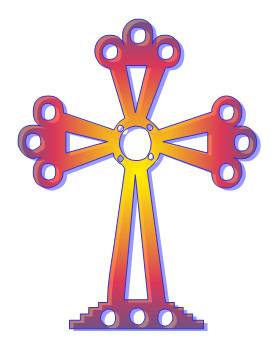
Anthony Browne
The Spectator
26 March 2005
For most citizens of Iraq, the invasion meant the end of tyranny. For one group, however, it meant a new start: the country’s historic Christian community. When the war stopped, persecution by Islamists, held in check by Saddam, started.
At a church in Basra I visited a month after the war ended, the women complained of attacks against them for not wearing the Islamic veil. I saw many Christian-owned shops that had been firebombed, with many of the owners killed for exercising their legal right to sell alcohol. Two years and many church attacks later, Iraq may still be occupied by Christian foreign powers, but the Islamist plan to ethnically cleanse Iraq of its nearly 2,000-year-old Assyrian and Armenian Christian communities is reaching fruition.
 |
There is nothing unusual about the persecution of Iraqi Christians, or the unwillingness of other Christians to help them. Rising nationalism and fundamentalism around the world have meant that Christianity is going back to its roots as the religion of the persecuted. There are now more than 300 million Christians who are either threatened with violence or legally discriminated against simply because of their faith — more than any other religion. Christians are no longer, as far as I am aware, thrown to the lions. But from China, North Korea and Malaysia, through India, Pakistan and Sri Lanka to Egypt, Saudi Arabia and Turkey, they are subjected to legalized discrimination, violence, imprisonment, relocation and forced conversion. Even in supposedly Christian Europe, Christianity has become the most mocked religion, its followers treated with public suspicion and derision and sometimes — such as the would-be EU commissioner Rocco Buttiglione — hounded out of political office.
I am no Christian, but rather a godless atheist whose soul doesn’t want to be saved, thank you. I may not believe in the man with the white beard, but I do believe that all persecution is wrong. The trouble is that the trendies who normally champion human rights seem to think persecution is fine, so long as it’s only against Christians. While Muslims openly help other Muslims, Christians helping Christians has become as taboo as jingoistic nationalism.
On the face of it, the idea of Christians facing serious persecution seems as far-fetched as a carpenter saving humanity. Christianity is the world’s most followed religion, with two billion believers, and by far its most powerful. It is the most popular faith in six of the seven continents, and in both of the world’s two biggest economies, the US and Europe. Seven of the G8 richest industrial nations are majority Christian, as are four out of five permanent members of the UN Security Council. The cheek-turners control the vast majority of the world’s weapons of mass destruction.
When I bumped into George Bush in the breakfast room of the US embassy in Brussels last month, standing right behind me were two men in uniform carrying the little black ‘nuclear football’, containing the codes to enable the world’s most powerful Christian to unleash the world’s most powerful nuclear arsenal. Christians claiming persecution seem as credible as Bill Gates pleading poverty. But just as Christian-majority armies control Iraq as it ethnically cleanses itself of its Christian community, so the power of Christian countries is of little help to the Christian persecuted where most Christians now live: the Third World.
Across the Islamic world, Christians are systematically discriminated against and persecuted. Saudi Arabia — the global fountain of religious bigotry — bans churches, public Christian worship, the Bible and the sale of Christmas cards, and stops non-Muslims from entering Mecca. Christians are regularly imprisoned and tortured on trumped-up charges of drinking, blaspheming or Bible-bashing, as some British citizens have found. Just last month, furthermore, Saudi Arabia announced that only Muslims can become citizens.
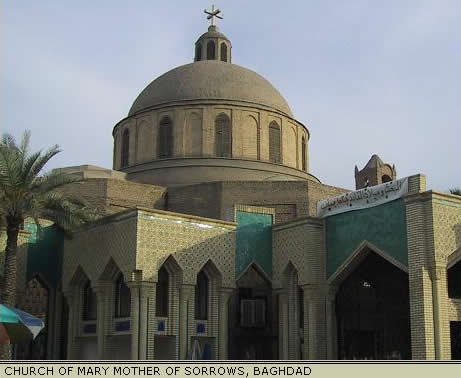 |
The Copts of Egypt make up half the Christians in the Middle East, the cradle of Christianity. They inhabited the land before the Islamic conquest, and still make up a fifth of the population. By law they are banned from being president of the Islamic Republic of Egypt or attending Al Azhar University, and severely restricted from joining the police and army. By practice they are banned from holding any high political or commercial position. Under the 19th-century Hamayouni decrees, Copts must get permission from the president to build or repair churches — but he usually refuses. Mosques face no such controls.
Government-controlled TV broadcasts anti-Copt propaganda, while giving no airtime to Copts. It is illegal for Muslims to convert to Christianity, but legal for Christians to convert to Islam. Christian girls — and even the wives of Christian priests — are abducted and forcibly converted to Islam, recently prompting mass demonstrations. A report by Freedom House in Washington concludes: ‘The cumulative effect of these threats creates an atmosphere of persecution and raises fears that during the 21st century the Copts may have a vastly diminished presence in their homelands.’
Fr Drew Christiansen, an adviser to the US Conference of Bishops, recently conducted a study which stated that ‘all over the Middle East, Christians are under pressure. “The cradle of Christianity” is under enormous pressure from demographic decline, the growth of Islamic militancy, official and unofficial discrimination, the Iraq war, the Palestinian Intifada, failed peace policies and political manipulation.’
In the world’s most economically successful Muslim nation, Malaysia, the world’s only deliberate affirmative action programme for a majority population ensures that Muslims are given better access to jobs, housing and education. In the world’s most populous Muslim nation, Indonesia, some 10,000 Christians have been killed in the last few years by Muslims trying to Islamify the Moluccas.
In the Islamic Republic of Pakistan, most of the five million Christians live as an underclass, doing work such as toilet-cleaning. Under the Hudood ordinances, a Muslim can testify against a non-Muslim in court, but a non-Muslim cannot testify against a Muslim. Blasphemy laws are abused to persecute Christians. In the last few years, dozens of Christians have been killed in bomb and gun attacks on churches and Christian schools.
In Nigeria, 12 states have introduced Sharia law, which affects Christians as much as Muslims. Christian girls are forced to wear the Islamic veil at school, and Christians are banned from drinking alcohol. Thousands of Christians have been killed in the last few years in the ensuing violence.
Although persecution of Christians is greatest in Muslim countries, it happens in countries of all religions and none. In Buddhist-majority Sri Lanka, religious tension led to 44 churches being attacked in the first four months of 2004, with 140 churches being forced to close because of intimidation. In India, the rise of Hindu nationalism has lead to persecution not just of Muslims but of Christians. There have been hundreds of attacks against the Christian community, which has been in India since ad 100. The government’s affirmative action programme for untouchables guarantees jobs and loans for poor Hindus and Buddhists, but not for Christians.
Last year in China, which has about 70 million Christians, more than 100 ‘house churches’ were closed down, and dozens of priests imprisoned. If you join the Communist party, you get special privileges, but you can only join if you are atheist. In North Korea, Christians are persecuted as anti-communist elements, and dissidents claim they are not just imprisoned but used in chemical warfare experiments.
Dr Patrick Sookhdeo, director of the Barnabas Trust, which helps persecuted Christians, blames rising global religious tension. ‘More and more Christians are seen as the odd ones out — they are seen as transplants from the West, and not really trusted. It is getting very much worse.’
Even in what was, before multiculturalism, known as Christendom, Christians are persecuted. I have spoken to dozens of former Muslims who have converted to Christianity in Britain, and who are shunned by their community, subjected to mob violence, forced out of town, threatened with death and even kidnapped. The Barnabas Trust knows of 3,000 such Christians facing persecution in this country, but the police and government do nothing.
You get the gist. Dr Paul Marshall, senior fellow at the Centre for Religious Freedom in Washington, estimates that there are 200 million Christians who face violence because of their faith, and 350 million who face legally sanctioned discrimination in terms of access to jobs and housing. The World Evangelical Alliance wrote in a report to the UN Human Rights Commission last year that Christians are ‘the largest single group in the world which is being denied human rights on the basis of their faith’.
Part of the problem is old-style racism against non-whites; part of it is new-style guilt. If all this were happening to the world’s Sikhs or Muslims simply because of their faith, you can be sure it would lead the 10 O’Clock News and the front page of the Guardian on a regular basis. But the BBC, despite being mainly funded by Christians, is an organisation that promotes ridicule of the Bible, while banning criticism of the Koran. Dr Marshall said: ‘Christians are seen as Europeans and Americans, which means you get a lack of sympathy which you would not get if they were Tibetan Buddhists.’
Christians themselves are partly to blame for all this. Some get a masochistic kick out of being persecuted, believing it brings them closer to Jesus, crucified for His beliefs. Christianity uniquely defines itself by its persecution, and its forgiveness of its persecutors: the Christian symbol is the method of execution of its founder. Christianity was a persecuted religion for its first three centuries, until Emperor Constantine decided that worshipping Jesus was better for winning battles than worshipping the sun. In contrast, Mohammed was a soldier and ruler who led his people into victorious battle against their enemies. In the hundred years after the death of Mohammed, Islam conquered and converted most of North Africa and the Middle East in the most remarkable religious expansion in history.
To this day, while Muslims stick up for their co-religionists, Christians — beyond a few charities — have given up such forms of discrimination. Dr Sookhdeo said: ‘The Muslims have an Ummah [the worldwide Muslim community] whereas Christians do not have Christendom. There is no Christian country that says, “We are Christian and we will help Christians.”’
As a liberal democrat atheist, I believe all persecuted people should be helped equally, irrespective of their religion. But the guilt-ridden West is ignoring people because of their religion. If non-Christians like me can sense the nonsense, how does it make Christians feel? And how are they going to react? The Christophobes worried about rising Christian fundamentalism in Britain should understand that it is a reaction to our double standards. And as long as our double standards exist, Christian fundamentalism will grow.
[Zinda: Mr. Anthony Browne is Europe correspondent of the Times of London].
The Islamic Republic Of Iraq - Who Speaks for the People!
Rev. Ken Joseph
Japan
In the midst of the joy over an Iraqi government finally in place a word of caution!
As an Assyrian Christian, the indigenous people of Iraq we are extremely concerned for the future of Iraq. What has particularly bothered me is all the people who seem to always speak for the People!
First, was the election. In contrast to what is generally presented, it was not a "free and fair" election. Previous to the Election the Iraqi Government estimated from one to three million Iranians that had streamed across the border, many to illegally vote - of course for the radical, shiite slate.
In the North, out of 33 election offices, only nine were open and out of a worldwide population of at least three million only 32,000 votes were counted for the Assyrian Christians.
I was there during the time of Saddam. It was a living nightmare! The real "Abu Ghraib" was a torture chamber for Saddam. My relatives can show you the scars all over their body from their time there!
What were the Iraqis afraid of as war approached? Not the US Bombing but the release of chemical, biological and nuclear weapons by a cornered Saddam whom they to a man believed he had and would use!
Against the war? Are you kidding? The Iraqis were so desperate for a war to come to liberate them days before the war the talk of Baghdad was those who were going to commit suicide if the war did not come!
I was there on the day of the handover from the US to the UN. All those against the war said there would be dancing in the streets as the people had done when Saddams sons were killed and Saddam caught.
Baghdad on July 30? Total silence! No dancing! No parties! Just a quiet despair settled over the city. Iraqis quietly asked "Are the Americans going to leave?"!
Hardly rejoicing!
For all of Saddam Husseins faults - and I was there during his time in power - he severely limited any role for religion in the Government. The result a secular, modern Iraqi population, cowered, intimidated and cut off from the world as they were.
A few months ago I had a long conversation with Ibrahim al-Jaffari who just became the new Prime Minister of Iraq.
Having met him on a number of occasions in Baghdad, including the day of the installation of the new Iraqi Government in July of 2004 I found him to be open, kind and helpful in particular to the plight of the minorities in Iraq.
In our long discussion, though I became very troubled.
My question to Mr. Jaffari was very simple. I asked:
"Mr. Jaffari, for those of us who are not moslems we are deeply concerned about the future of Iraq and the role of islam in Iraq. As you know Saddam Hussein, for all his faults did not allow religious influence in the Government.
|
Assyrian Continuity from Fall of Nineveh to Modern Times / 309 pages
Hard Cover $30
Paperback (Soft Cover) $20
Price includes shipping and handling.
Send money orders (preferred)
or personal checks to:
Fred Aprim
P.O. Box 446
Hayward, CA. 94543 USA
|
|
In particular when the Governing Council of the previous Iraqi Government set up a constitution committee they specifically voted, across religious and ethnic lines that there should be no mention of idealogy or religion in the new Iraqi constitution.
Why, when this was so clear and the feeling of the Iraqi people so clear did you insist on having Article 7 - Islam is the religion of the nation - "
Mr. Jaffari replied " If we did not put islam as the religion of the state the people would revolt!"
I turned to Mr. Jaffari and with a smile said "Mr. Jaffari, I think you have been outside of Iraq too long - he was in Iran for 10 years and the UK for 13 - You have lost touch with your people. They are secular! Of course there are many, in the south mostly who are somewhat religious, but the people do not want any involvement of the mullahs or religious leaders in government at all. They are very, very clear that they do not want to become anything even remotely like Iran."
Mr. Jaffari appeared shocked. He started to protest when his aide, an Iraqi interjected.
"Sir", he said, looking at Mr. Jaffari, "he is right - the people have changed, they do not want any part in any form of religion in Government."
It was a very telling moment for someone who was the head of the Dawa Party a radical islamic party and a close confident of Mr. Sistani, the Iranian head of the shiite movement in Iraq.
Further, just a few days ago I had a conversation with Lakhdar Brahimi, the former Algerian Foreign Minister and the man appointed by Kofi Annan to put together a government following the handing over of power by the Coalition Provisional Authority in July of last year.
Mr. Brahimi, similarly had no apologies for moving Iraq away from its secular, open situation to a islamic path in defiance of the will of the people.
"I simply facilitated things. I have no agenda other than to let the Iraqi people express their will." he said.
In fairness to Mr. Jaffari, he also promised when in power that he would protect the rights of the minorities. "When things settle down, come and see me again. I will assign a team from the government to go with you all over Iraq and we will do a survey of the Assyrian Christians to find out their needs and put in place measures to help and protect them."
At the same time, I sensed the same theme - outsiders, more radical that those in the country claiming to speak "for the people.'
It is not too late! 1,500 plus American heroes did not die to create "The Islamic Republic Of Iraq" nor were lives given to deny the poor Iraqi People their voice.
The next battle in Iraq is over the constitution. If Mr. Jaffari, the Iranian Sistani and the others who are out of touch with the Iraqi people who have only one desire - we just want to be normal - no Saddam, no mullahs or religious leaders in Government - have their way Iraq will become The Islamic Republic of Iraq.
If the Iraqi peoples voice can truly be heard it will be simply "The Republic of Iraq."
The world must stand on the side of the long suffering Iraqi people, who after getting rid of one nightmare do not deserve to have another!
[Zinda Magazine was informed that Rev. Ken Joseph Jr. has been hospitalized with what appears to be symptoms of a rare blood disease apparently contracted in Iraq.
Rev. Joseph has been in Iraq since before the War and working tirelessly on behalf of the Assyrian Christians of Iraq. Rev. Joseph requests the thoughts and prayers of our readers for a complete recovery.]
|


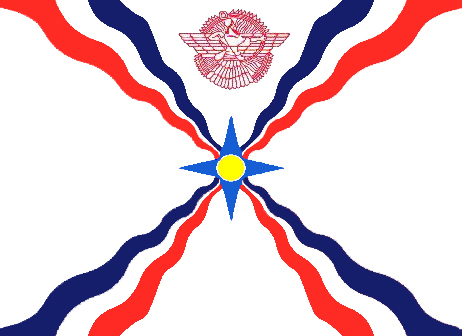
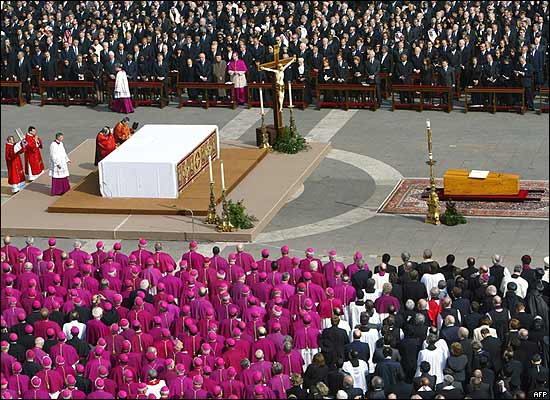
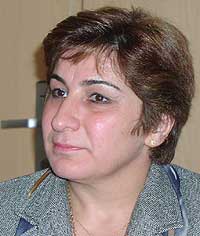
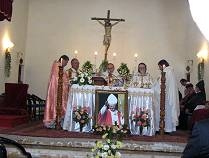
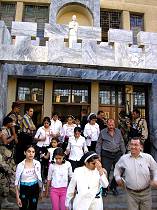
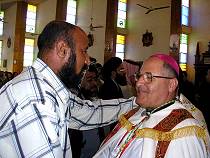
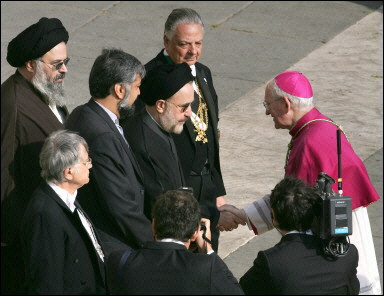
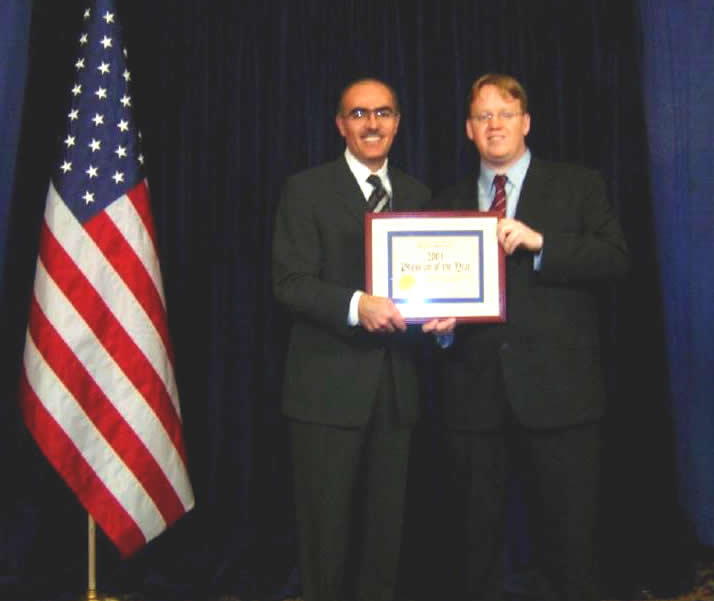
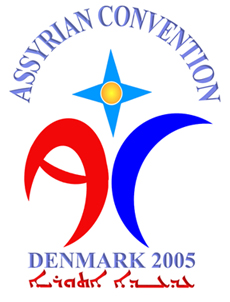

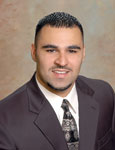




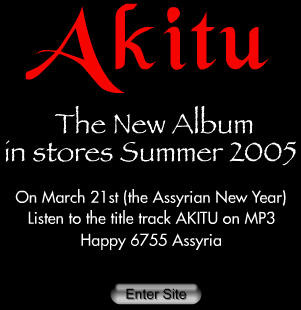
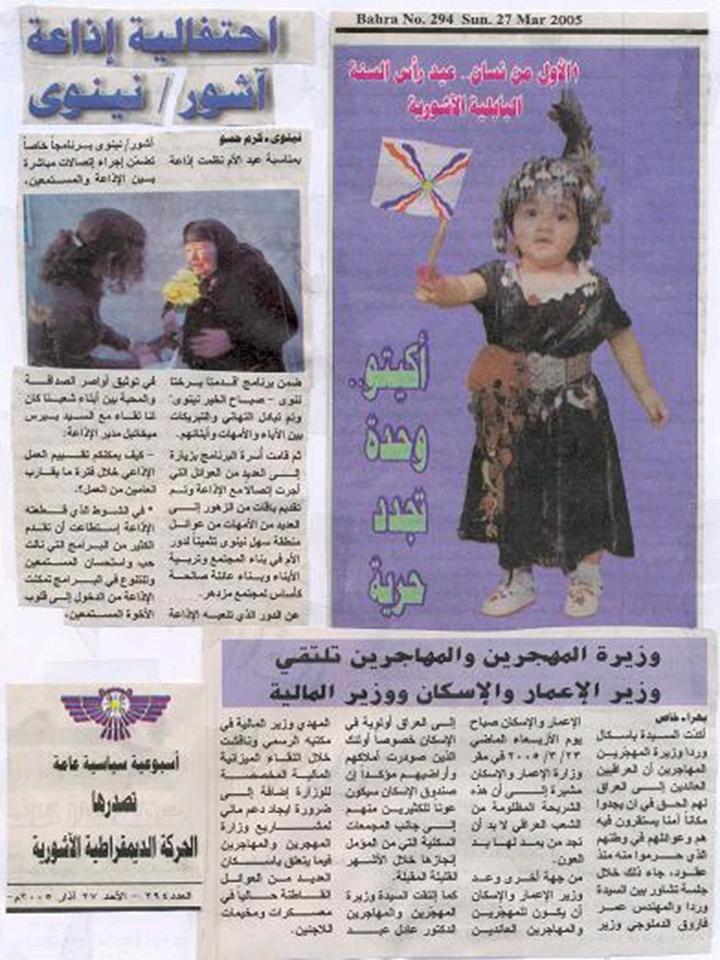
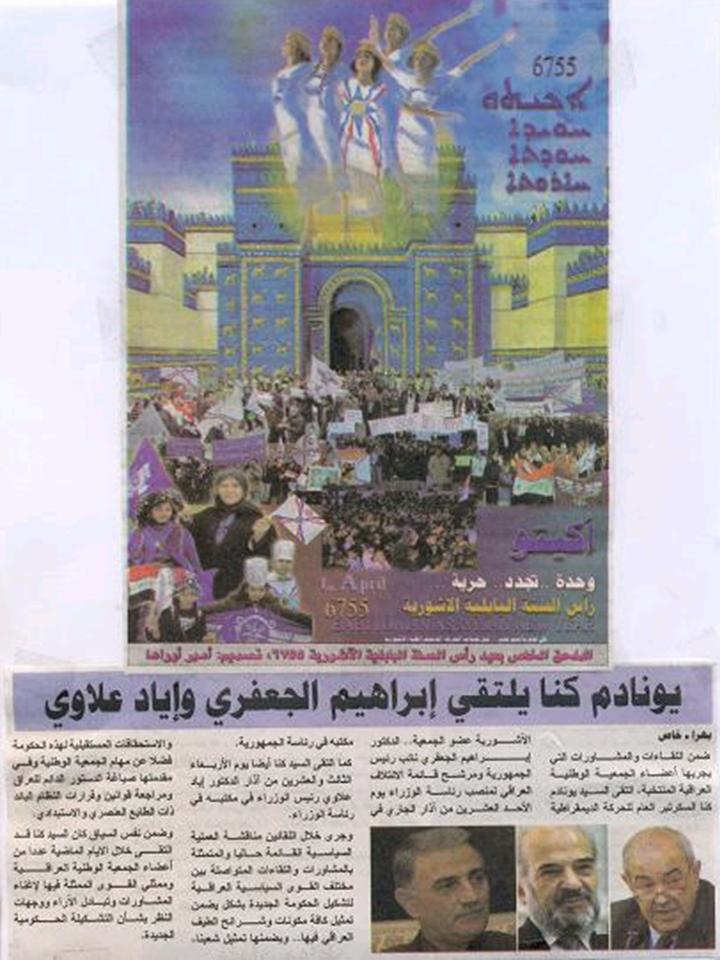




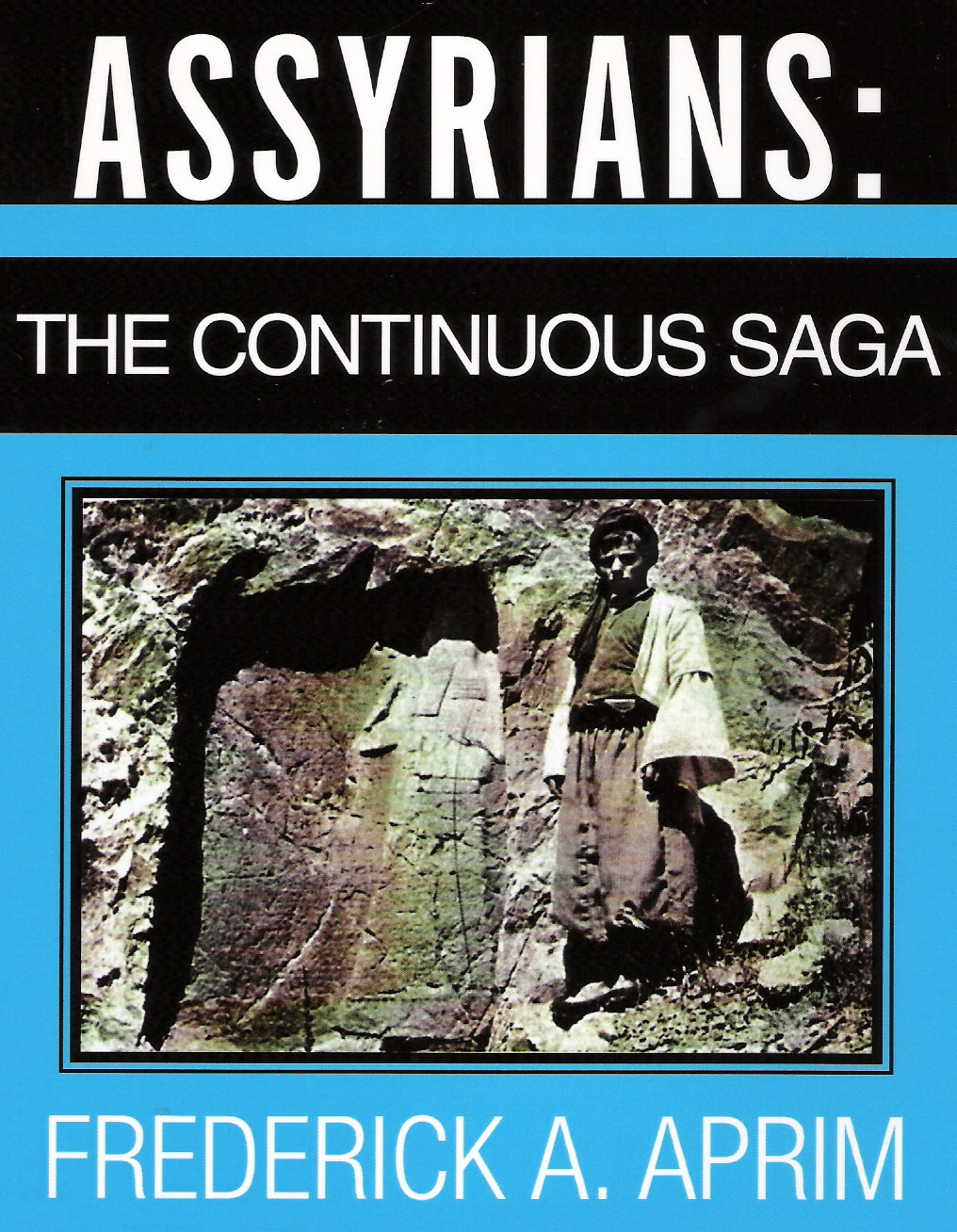
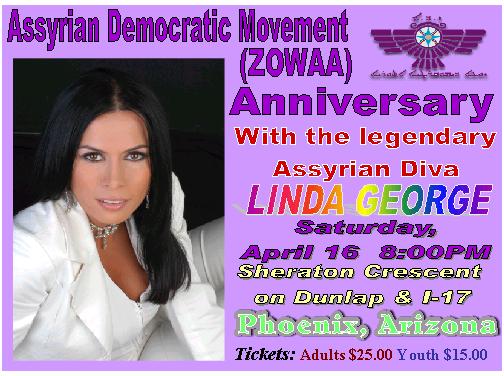
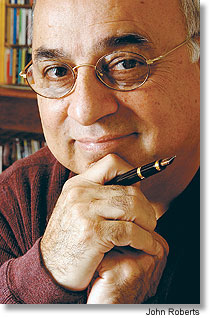

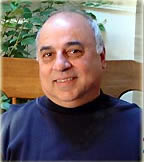 “Sometimes I get carried away. You have work to do, and I have to get ready.”
“Sometimes I get carried away. You have work to do, and I have to get ready.”